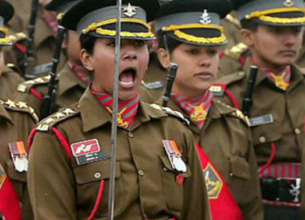Permanent Commission for 11 Women Officers
Why in News?
- SC has directed IAF and central government to consider granting Permanent Commission (PC) to 32 retired women officers
What is a Permanent Commission?
- The Permanent Commission entitles an officer to serve in the Armed Force till he/she retires unlike Short Service Commission (SSC), which is currently for 10 years and can be extended by four more years, or a total of 14 years.
Background of the issue:
- The order came on after a SC verdict with nearly a 10-year-old appeal filed by the government against a 2010 decision of the Delhi High Court to grant SSC women officers permanent commission.
- The induction of women officers in the Army started in 1992. Recruits under the Women Special Entry Scheme (WSES) had a shorter pre-commission training period than their male counterparts who were commissioned under the Short Service Commission (SSC) scheme.
- In 2006, the WSES scheme was replaced with the SSC scheme, which was extended to women officers. They were commissioned for a period of 10 years, extendable up to 14 years.
- According to government, isolation and hardships would eat into their resolve and they would have to heed to the call of pregnancy, childbirth and family. Women ran the risk of capture by enemy and being taken prisoner of war.
What is the Significance of the Court Order?
- Article 14 and 15 states Right to Equality and the State shall not discriminate against any citizen on grounds only of religion, race, caste, sex, place of birth or any of them respectively.
- The court found the remarks in the note not only constitutionally invalid but discriminatory, affecting the dignity of women officers.
- It also declared that Short Service Commission (SSC) women officers are eligible for permanent commission and command posts in the Army irrespective of their years of service.
Implications of the order:
- The women officers can now occupy all the command appointments, at par with male officers, which would open avenues for further promotions to higher ranks for them.
- If women officers had served only in staff, they would not have gone beyond the rank of Colonel. After implementation of the judgement, a woman can rise to the rank of Colonel and above based on merit, like their male counterparts.
- At the rank of Colonel, an officer picks up a substantive command and would be delegated to carry out independent tasks.
- A Colonel commands a battalion, which typically consists of 850 men. A woman officer who is successful in this position could technically rise to the highest ranks of the Army, though, women officers will not be inducted into the combat arms such as the infantry, artillery or armored corps.
Way Forward:
- Presently, adjustments, both in thought and letter, are necessary to rebuild the structures of an equal society. These adjustments and amendments however, are not concessions being granted to a set of persons, but instead are the wrongs being remedied to obliterate years of suppression of opportunities which should have been granted to women.
- It is not enough to proudly state that women officers are allowed to serve the nation in the Armed Forces, when the true picture of their service conditions tells a different story.
- A superficial sense of equality is not in the true spirit of the Constitution and attempts to make equality only symbolic.







